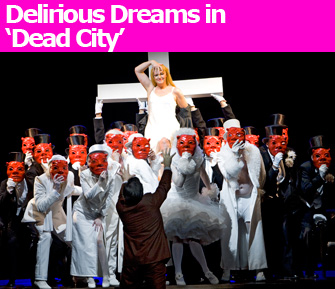 |
|
Paul (Robert Dean Smith) and Marietta (Ricarda Merbeth) in one of Paul’s dreams. Photo: Opéra National de Paris/ Bernd Uhli |
We all know about the destruction wrought by Hitler and his henchmen on the world of the arts: huge collections of paintings were plundered …
 |
|
Paul (Robert Dean Smith) and Marietta (Ricarda Merbeth) in one of Paul’s dreams. Photo: Opéra National de Paris/ Bernd Uhli |
We all know about the destruction wrought by Hitler and his henchmen on the world of the arts: huge collections of paintings were plundered from Jewish families; “degenerate” artworks were destroyed; and, of course, many artists, authors and composers perished in the concentration camps. But the way the Nazis continue to shape cultural tastes even today is less often acknowledged.
When Hitler came to power in Germany in 1933, the 36 year-old Erich Korngold (a child prodigy whose talents had continued to blossom in adulthood) had already composed four operas and was the most widely performed composer of the day. Forced to leave Germany because of his Jewish roots, Korngold travelled to the United States with his family and made his living by writing scores for various Hollywood movies, including The Adventures of Robin Hood, starring Errol Flynn. Although he continued to write serious music, his prestige waned not only in Nazi Germany but also everywhere else. While the operas of Richard Strauss, fêted by the Nazi regime, continue to be performed throughout the world, Korngold’s operas now seem to reappear only as interesting rarities.
Korngold’s Die Tote Stadt, inspired by George Rodenbach’s novel Bruges-la-Morte, with a libretto by Korngold and his father, Julius Korngold (writing under the pseudonym Paul Schott), had the distinction of being premiered concurrently in both Hamburg and Cologne in 1920, yet only in recent years has serious attention been paid once more to this neglected masterpiece, which is surely as good as the most significant of Strauss’s output.
Willy Decker’s wonderful production, which was staged at Covent Garden in London earlier this year, has been transferred to the Opéra de Paris at Bastille, and the result is even more of a triumph than it was in London. Whereas the quirks of the Covent Garden theater made many of the backdrops impossible to view from certain parts of the house, the more modern Bastille stage is visible to almost all spectators.
The story centers around Paul, who stays shut up in his home in Bruges, where he has created a temple to his dead wife, Marie, while being looked after by his faithful housekeeper, Brigitta. When his friend Frank visits him at the beginning of the opera, Paul says he has met a woman whose resemblance to Marie is remarkable and who has agreed to visit him. This is Marietta, a seductive, free-spirited dancer. After her brief visit, Paul falls into a hallucinatory dream mingling his delirious desires for Marietta, feelings of guilt and quasi-religious memories of Marie. It makes for an extraordinary post-Freudian study of the mourning process, and I defy anyone not to be moved by the opera’s ending. Decker’s use of different levels of the stage and various fragments and manifestations of Marie’s portrait makes also for a visually stunning experience.
Musically, Die Tote Stadt is glorious. Not only is the opera punctuated by gorgeous set-pieces such as Marietta’s song and Pierrot’s aria, but even a secondary character like Brigitta is given beautiful music that reveals her own deep feelings for her employer.
Few operas have more taxing parts to sing than those of Paul and Marietta, and the American tenor Robert Dean Smith and German soprano Ricarda Merbeth give superlative performances. French baritone Stéphane Degout and Austrian mezzo-soprano Doris Lamprecht are perfectly nuanced in the roles of Frank and Brigitta. Completing the impressive multinational lineup, Israeli conductor Pinchas Steinberg directs an inspired Orchestre de l’Opéra National de Paris.
On the night I went, there were a number of empty seats. If you are in Paris for one of the remaining few performances of Die Tote Stadt, make every effort to go and see a work that deserves to become as important a part of the operatic repertoire as Der Rosenkavalier.
Opéra National de Paris: Place de la Bastille, 75012 Paris. Métro: Bastille. Tel.: 0 892 89 90 90 or + 33 (0)1 71 25 24 23 (from abroad). Remaining performances: October 19, 22, 24 and 27 at 19h30. Tickets: €5-€138. www.operadeparis.fr
Buy works by and about Erich Korngold from the Paris Update store.
Reader Reaction
Click here to respond to this article (your response may be published on this page and is subject to editing).
© 2009 Paris Update
Favorite